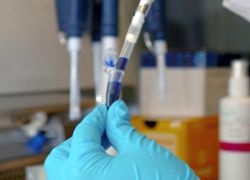Development of potential Hepatitis C vaccine
The British Midlands' University of Nottingham discovered a possible vaccine for use in the treatment of Hepatits C. At the 161st. meeting of the Society for General Microbiology in Edinburgh, UK, a paper titled “Human Antibodies to Hepatits C Virus – Potential for Vaccine Design” was presented.

Approximately 150-200 million people worldwide are infected with the Hepatitis C virus. The infection often results in chronic hepatitis which can lead to cirrhosis of the liver and liver cancer. Hepatits C is the most common reason for liver transplantation in both the US and UK. At present, there is no vaccination that protects against contracting Hepatitis C.
Now a research group analyzed antibodies that have potential to successfully prevent infection with Hepatitis C. In laboratory models the antibodies proved to be effective against many diverse strains of the virus. The HCV is classified into six major genotypes with an existing 30 subtypes.
“The clinical potential of this work cannot be overstated. Historically, successful vaccines against viruses have required the production of antibodies, and this is likely to be the case for Hepatitis C virus. Identifying regions of the virus that are able to induce broadly reactive neutralizing antibodies is a significant milestone in the development of a HCV vaccine, which will have distinct healthcare benefits for hepatitis sufferers, and could also help us design vaccines for other chronic viral diseases such as HIV,” said Dr. Alexander Tarr, a Research Fellow at Nottingham's Institute of Infection, Immunity and Inflammation, during the presentation.
"We are also currently exploring the possibility of improving liver transplantation success rates by passively infusing people with these antibodies. Additionally we are using the information gained by identifying and characterizing the antibody responses to Hepatitis C virus to design new ways of making vaccine candidates. If the antibodies we have discovered can be reproduced by vaccination, control of the disease might be possible," concludes Dr. Tarr.
18.09.2007





